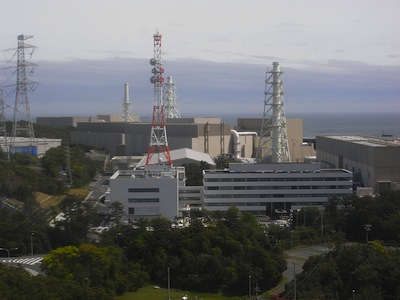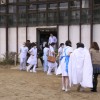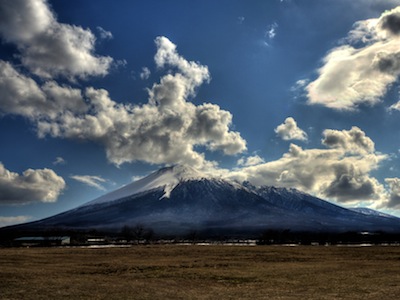Italian living in Tokyo, between March 2009 and September 2011 I was the Japanese language co-editor for Global Voices with Tomomi Sasaki.
Latest posts by Scilla Alecci
Sing Out from Japan
Musicians from the earthquake-hit areas united and gave life to a project called Sing Out From Japan [en,ja]. They have released two songs so far: Let's go home/lawblow and One love/I shall walk looking up, which are both cover versions of popular songs. The videos were shot in the regions...
Japan: A Revealing Blog by a Fukushima Robot Operator
Blogger Erico Guizzo at IEEE Spectrum's robotics blog reported that “an anonymous worker at Japan’s Fukushima Dai-ichi nuclear power plant has written dozens of blog posts describing the ups and downs of his experience as one of the lead robot operators at the crippled facility.” The blog was called “Say...
Japan: How to Unplug Your Life and Save Electricity
People in Japan have been unplugging their lives as electricity-saving measures have been implemented to cope with power shortages. The effectiveness of the measures is yet to be proven but many have taken this opportunity to change their power consuming life style.
Japan: “Plutonium is safe,” they say
Youtube user tokyobrowntabby has translated into English the video clips of three Japanese nuclear researchers who claimed safety for plutonium in a TV show. A blogger at EX-SKF – who nicknamed the researchers the “Three Plutonium Brothers” – posted the transcript [en] of their speeches.
Walking through Japan
On August 1st Thomas Köhler started a mission: to walk trough three of the major Japanese islands, from Hokkaido to Kyushu. Köhler – who works as a manager at a tour operator – came up with the project after the March 11 disaster, when the number of visitors to Japan...
Japan: A Nuclear Gypsy’s Tale
Blogger Takeshi Kawakami was one of Japan's so-called ‘nuclear gypsies’, who for about 30 years made his livelihood working at the country's different nuclear plants. In his blog he has denounced the corruption and collusion between the government and the nuclear industry.
U.S.A., Japan: The US Declares War On The Japanese Mafia
Investigative journalist Jake Adelstein reported [en] that US President Obama has officially declared war on the Yakuza, the Japanese mafia, as it represents an “extraordinary threat to the national security, foreign policy, and economy of the United States.” Japansubculture.com also published the text of the actual executive order.
Japan: On Fake Glasses
Marxy at Neojaponisme gives an interesting insight [en] on the “lens-less frame” trend spreading in Japan.
Japan: Indie Music Rocks the Nukes
With a spreading nuclear crisis and related issues such as radiation fears, new energy policies on the horizon and an uncertain future for the operating reactors, Japanese netizens have started a revival of music videos with a clear anti-nuclear message.
Japan: A Fukushima Poet Tweets His Verses
Since the March 11 Japan earthquake and tsunami disaster, Ryoichi Wago, a poet from Fukushima city, has been experimenting with a new form of poetry. He expresses his feelings about issues such as uncertainty of the future and fear of the radiation that has been threatening his land and its inhabitants.
Japan: Uncanny Terrain, a documentary on Fukushima farmers
Filmmakers Junko Kajino and Ed M. Koziarski have been working on a documentary about the organic farmers of the Fukushima Prefecture. The film titled Uncanny Terrain will examine “the impact of the nuclear disaster on the farmers, their land, the food they produce, and their customers.” At the homonymous blog...
Japan: Real Voices, Real Japan
An Enligh-language website called Real Voices, Real Japan documents “the business environment and recovery in post-quake Japan.” Its purpose is to “keep foreign business communities up to date on the Japanese recovery and enables decision-making based on accurate, locally-sourced information.”
Japan: Original photos of Fukushima Daiichi
Flickr user hige-darumaひげだるまattractive woman published photos of the Fukushima Daiichi nuclear power plant taken during a tour of the facilities in June 1999. Tepco employees’ faces have been blurred but it is possible to see what's inside the plant.
Japan: Tokyo after the earthquake
Photographer Francis Harrison published a photo essay [en] that portrays Tokyo in the first few weeks after the earthquake.
Japan: Video Haiku
Vimeo user Stephen Niebauer presents a project called Video Haiku. A haiku is a short form of Japanese poetry that usually consists of three verses of 5,7 and 5 morae. “So, for this project, your video structure should be like this: 5 second shot, 7 second shot, 5 second shot.”
Japan: Aiding the Aid Workers
After more than two months from the earthquake around 110,000 people are still living in evacuation centers. Along with victims of the disaster, some of the volunteers, doctors and aid workers helping them are beginning to suffer from emotional stress and fatigue.
Japan: No Nuke Art
A group of anti-nuclear activists started No Nuke Posters [en], a project “for a post-nuclear future and for those working to rebuild amid Japan's nuclear crisis”. They accept submissions of original artworks [en] that will be published on the website under Creative Commons license (by-nc-sa).
Japan: Holiday in Fukushima
The author of Spike Japan decided to spend last week's national holidays in the Fukushima prefecture. In his latest post he chronicles his journey [en] to the tsunami hit area and its surroundings.
Japan: Manga artist's Smiles
Popular manga artist Takehiko Inoue has been publishing original portraits of Japanese people through his twitter account @inouetake with the hashtags #prayforjapan and #tsunami. The series is called Smile.
Japan: Sanka, Legendary Gypsies Living in the Wild
A documentary has recently revived interest in the existence of the 'Sanka', a group of people who are said to have lived in the remote mountains and plains of the Japanese archipelago until the 1970s. Some bloggers have speculated on the origins of these legendary nomads.
Japan: Netizens react to the arrest of an Englishman
Japan Probe translated the comments [en] of some netizens who reacted to the arrest of an English man who grabbed “a mike from a politician at a train station and yelled about how Japanese elections are loud and annoying.”






